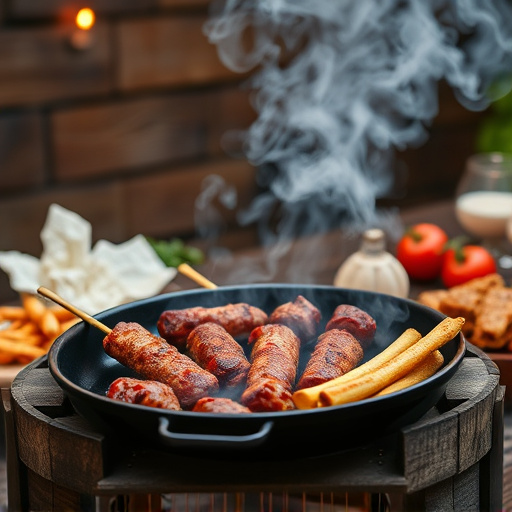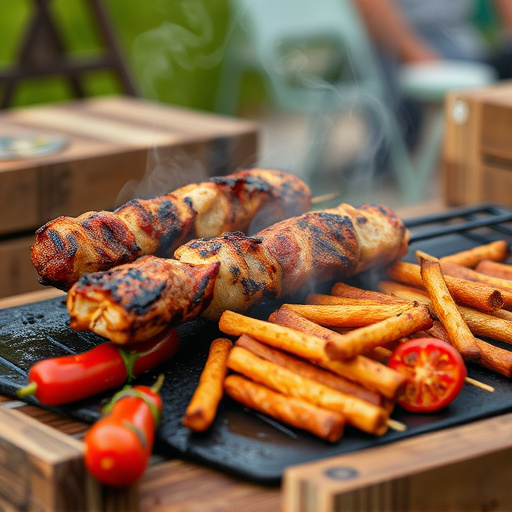Creating healthier BBQ meatballs involves choosing lean proteins like turkey or plant-based options, balancing flavors in a homemade sauce, adding vegetables for moisture and nutrients, using binding agents sparingly, and seasoning creatively to avoid excess salt and fat. Grilling to 165°F (74°C) ensures juiciness. Present them over quinoa, brown rice, or skewered with veggies. Store properly and reheat gently for safety and quality.
Discover a healthier twist on your favorite classic, the BBQ meatball! This guide explores every aspect of creating delectable, nutritious meatballs. From choosing alternative proteins to mastering grilling techniques, we’ve got you covered. Learn to balance sweet and smoky flavors in a homemade BBQ sauce, incorporate vegetables for added nutrition, and perfect light, airy textures. Serve them creatively and store them smartly – this recipe ensures your BBQ meatballs stay juicy and delicious over time.
- Choosing the Right Protein: A Healthy Alternative to Traditional Meat
- Creating a Compelling BBQ Sauce: Balancing Sweet and Smoky Flavors
- Incorporating Vegetables: Adding Nutrition and Moisture to Meatballs
- Perfecting the Texture: Tips for Making Light and Airy Meatballs
- Seasoning Techniques: Elevating Flavor Without Excessive Salt or Fat
- Grilling Methods: Achieving a Perfectly Cooked, Juicy BBQ Meatball
- Serving Suggestions: Creative Ways to Present Your Healthy BBQ Meatballs
- Storing and Reheating: Keeping Your Delicious Creation Fresh Over Time
Choosing the Right Protein: A Healthy Alternative to Traditional Meat

When crafting a healthier version of a classic BBQ meatball recipe, selecting the right protein is key. Traditional meatballs often rely on beef or pork, but for a nutritious twist, consider alternatives like turkey or even plant-based options such as quinoa or chickpeas. These choices offer a lower fat content and are rich in lean proteins, making them suitable for a balanced diet without compromising on taste or texture.
Incorporating these healthy substitutes into your BBQ meatball recipe allows you to enjoy the classic flavors while aligning with dietary preferences that promote overall well-being. Whether you opt for turkey ground or explore plant-based alternatives, the result is a delectable and satisfying dish that caters to modern eating habits without sacrificing culinary delight.
Creating a Compelling BBQ Sauce: Balancing Sweet and Smoky Flavors

Creating a compelling BBQ sauce is key to enhancing your meatball recipe, especially if you’re aiming for a healthy twist on the classic. The balance between sweet and smoky flavors is essential; too much of one can overpower the other, resulting in an unbalanced taste. To achieve this delicate equilibrium, start with a base of tomato paste or pureed tomatoes, which provide a rich, tangy flavor. Add a touch of brown sugar to offset the acidity while bringing a subtle sweetness to the sauce. For the smoky element, incorporate liquid smoke or a pinch of smoked paprika, allowing these ingredients to impart a deep, savory note without overpowering the overall profile.
Experiment with spices such as garlic powder, onion powder, and chili flakes for added depth and heat. Remember, when crafting your BBQ sauce, less is often more. A moderate approach ensures that each bite of your meatballs is a harmonious blend of flavors, making your healthy twist on the classic BBQ meatball recipe truly memorable.
Incorporating Vegetables: Adding Nutrition and Moisture to Meatballs

Incorporating vegetables into your classic BBQ meatballs is a delicious and healthy twist on this beloved recipe. Not only do they add essential nutrients, but they also contribute to keeping your meatballs moist and juicy. Carrots, zucchini, and bell peppers are excellent choices as they grind down easily and provide a subtle sweetness that complements the rich flavors of meat and BBQ sauce.
When preparing your veggie-infused meatballs, finely chop or grate these vegetables and mix them with your ground meat. This blend will result in a more substantial and flavorful end product. The added moisture from the vegetables also helps to prevent dryness, ensuring that each bite is as tantalizing as the last.
Perfecting the Texture: Tips for Making Light and Airy Meatballs

Achieving the perfect texture for BBQ meatballs is key to a delightful dining experience. For a light and airy result, focus on selecting the right type of meat—a blend of lean protein like turkey or chicken with a small portion of fat ensures your meatballs stay moist but not heavy. When mixing the ingredients, take your time to gently combine them; overmixing can lead to dense, compact balls.
Consider adding binding agents like breadcrumbs or crushed crackers for structure without heaviness. These agents absorb excess moisture and help hold the meatballs together, allowing them to maintain their shape during cooking. Additionally, lightly greasing your hands with oil before shaping the mixture prevents the meat from sticking, making the process easier and ensuring each ball has a smooth, airy texture.
Seasoning Techniques: Elevating Flavor Without Excessive Salt or Fat

In crafting a healthy twist on a classic BBQ meatball recipe, the key lies in seasoning techniques that elevate flavor without relying on excessive salt or fat. Start by mixing ground turkey or lean beef with finely chopped vegetables like onion and garlic for natural richness and complexity. This not only reduces overall fat content but also adds depth to the taste profile.
Instead of heavy sauces, focus on a balanced blend of herbs and spices such as paprika, black pepper, and a pinch of cayenne pepper for heat. For an authentic BBQ vibe without the extra calories, brush the meatballs with a vinegar-based glaze or a mix of barbecue sauce diluted with apple juice. This not only keeps the recipe healthier but also ensures that each bite is packed with flavor, making it a satisfying alternative to traditional high-sodium, high-fat BBQ meatballs.
Grilling Methods: Achieving a Perfectly Cooked, Juicy BBQ Meatball

Grilling is an excellent method to achieve a perfectly cooked and juicy BBQ meatball. The direct heat from the grill ensures that the meatballs brown evenly while locking in their natural juices, resulting in a tender and flavorful treat. When grilling BBQ meatballs, it’s essential to preheat your grill to a medium-high temperature, allowing for even searing without overcooking the delicate meat mixture. Place the meatballs on the grill grates, maintaining a safe distance from the direct flame to prevent burning. Turn them occasionally to promote even cooking and use a meat thermometer to ensure they reach an internal temperature of 165°F (74°C), guaranteeing food safety and maximum juiciness.
For the best BBQ meatball recipe results, consider using a mix of lean and fatty ground meats, such as beef and pork, to add moisture and flavor. A simple combination of herbs like oregano, basil, and garlic, along with a splash of BBQ sauce or a drizzle of olive oil, can enhance the taste without overwhelming it. The key to a successful grilling experience is patience; allow the meatballs to cook thoroughly while gently turning them, ensuring each side gets its turn under the grill’s heat.
Serving Suggestions: Creative Ways to Present Your Healthy BBQ Meatballs

Presenting your healthy BBQ meatballs in creative ways can elevate the dining experience and make it more engaging. For a rustic touch, serve them over a bed of quinoa or brown rice, garnished with fresh herbs and a squeeze of lemon. This combination offers a nutritious alternative to traditional pasta, providing fiber and protein while maintaining the hearty appeal of a BBQ meal.
Alternatively, consider skewering your meatballs and arranging them on a platter with roasted vegetables like bell peppers, zucchini, and cherry tomatoes. The vibrant colors and textures create an appealing dish that’s perfect for summer gatherings. Drizzle with a tangy BBQ sauce or offer a variety of dipping options to cater to different preferences while keeping the overall recipe healthy.
Storing and Reheating: Keeping Your Delicious Creation Fresh Over Time

Maintaining the freshness and quality of your BBQ meatballs is essential, especially if you’re preparing a large batch or planning to enjoy them over several meals. Storing these savory treats properly can ensure they stay delicious and safe to eat for an extended period. After cooling down completely, transfer your freshly cooked meatballs to an airtight container and refrigerate them within two hours of cooking. This practice helps prevent bacterial growth. You can store them in the fridge for up to one week or freeze them for longer-term preservation, making it convenient to have a supply on hand.
Reheating BBQ meatballs is straightforward; simply warm them gently in a pan over medium heat, stirring occasionally, until they reach an internal temperature of 165°F (74°C). Avoid overcooking or using high heat, as this can dry out the meatballs and compromise their texture and flavor. Reheat only as much as you plan to serve, and always consider reheating them in a covered container to prevent drying out.
